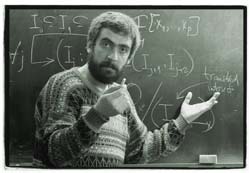
Prof. Sergei Yakovenko
As a child growing up in the former Soviet Union, there was no doubt in Sergei Yakovenko's mind that he would one day be a chemist. When he was 10, he read that phosphorus, a chemical element that glows in the dark, could be produced by boiling and sublimating urine. He tried the procedure. It was "a scientific and familial failure," he says. Coming home to the pungent smell of an experiment gone sour, his parents advised him to turn to the more theoretical sciences. Today, Sergei Yakovenko's field of interest is as theoretical as can be -- he is a professor in the Mathematics Department at the Weizmann Institute.
"Joining a children's summer math program at Moscow University at the age of 13 was the turning point of my life," he says. From there, he was assigned to a high school specializing in math. "Mathematics was the only profession that was both apolitical and promising in the Soviet Union in those days," says Yakovenko. "An artist, for instance, had from time to time to paint farmers ploughing fields, Lenin visiting a village, or subjects of that kind. On the other hand, working in the experimental sciences was possible in only a few well-funded institutions, most of them related to the military in some way or another. So what was left were the theoretical sciences."
But even in the seemingly pure field of math, not all were free to roam. Jews were not admitted to Moscow University because they were considered inherently treacherous. Since his papers and name did not disclose his religion, Sergei gained admittance. But as some suspicions remained, he had to undergo a six-hour examination at the blackboard, instead of the usual 15-minute one. Anna, Sergei's wife, did not even apply to Moscow University, for she had studied at a school known for its prominent Jewish attendance; all of its students were regarded as "potentially Jewish" and there was no chance of their being admitted.
"A most common reason for expulsion from the university was telling jokes," says Sergei, who professes to have told quite a number of them himself (after checking that there were no potential informers around). He gives an example of a joke that could ruin a career: "During one of the military parades at Red Square, Kremlin doctors succeed in bringing back to life three war generals: Adolf Hitler, Alexander the Great and Napoleon Bonaparte. Alexander the Great, watching the parade, says: 'If I had had such tanks I could have conquered the whole world!' Hitler says: 'If I could have had such intercontinental ballistic missiles I could have destroyed the whole world!' All the while, Napoleon sits deeply absorbed in reading Pravda. Finally, he mumbles: 'With such a newspaper, no one would have known I had lost the Battle of Waterloo.'"
Branded "politically illiterate" and "morally immature," Yakovenko was not accepted for Ph.D. studies at Moscow University. However, due to his perfect grade point average, he was allowed to request a position. (Jobs for the most part were decided by the government.) He found a chance job opening at the Institute of Control Sciences, where he earned his Ph.D.
In 1990, at the peak of perestroika, Yakovenko visited the Weizmann Institute. A year later, just after meeting Anna in Moscow, he was accepted as a researcher in the Faculty of Mathematics and Computer Science. For the whole of the following year, Sergei and Anna communicated by e-mail, until they married in 1992 in Moscow. "You could say it was love by e-mail," he says.
Today, they live at the Institute with their two child-ren (one from Anna's previous marriage; Sergei also has two children from a previous marriage living in Russia). Kostya, 10, who can almost always be found book in hand, wants to be an archaeologist. What will Anton, a three-year-old constantly on the move, be? "It's too soon to say," laughs Yakovenko, "but his temperament best suits a paratrooper." Anna agrees, adding, "I just hope he won't be a chemist. We all know the results of his father's first experiments!"
